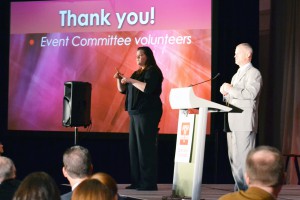15 easy ways to make your event accessible
by Sara
 Event planners live by lists, deadlines and details. I know this firsthand: on the morning of an event, we frantically cross tasks off to-do lists. But there is one very important item many event planners simply forget to include: accessibility.
Event planners live by lists, deadlines and details. I know this firsthand: on the morning of an event, we frantically cross tasks off to-do lists. But there is one very important item many event planners simply forget to include: accessibility.
My role at Easter Seals Crossroads in Indianapolis is to plan our special events and fundraisers. That includes everything from scoping out a potential venue to cleaning up after the event is over. Our mission is to improve the lives of individuals with disabilities, and that means each and every event I plan must meet all accessibility guidelines. But how do you know what an “accessible” event is?
Last month I participated in an Accessible Event Planning webinar conducted by the Northwest ADA Center to learn more about how my events could provide better access for a person with any disability or special need. I learned that accessibility considerations should be made with these categories in mind:
- mobility
- cognitive or learning
- health
- hearing and/or speech
- visual
- environmental
- psychiatric
And here are just a few questions event planners should be asking:
- Mobility: Where do people need to move within the event space?
- Space: Is there adequate space for a wheelchair to pass through?
- Flooring: Are there uneven spots that might cause a person with limited balance to fall?
- Cognitive or learning: Are your printed materials and signage written in a clear, concise manner?
- Communicating Directions: If you plan on verbally directing people at the event, will you be giving communication in a way that people with hearing or other disabilities can understand easily?
- Health: If your event has food, will you be offering options for dietary restrictions?
- Food/Allergies: Will you let people know if an item has nuts, milk or other possible allergens in it?
- Seating: Will there be seating available for those who cannot stand for long periods of time?
- Hearing or speech: Will an ASL interpreter be available to translate any verbal communication?
- Video: If you are showing videos, will they be captioned?
- Presenters: Are all presenters using microphones even if they don’t think they need one?
- Visual: If there is printed text, will you offer Braille or low-vision copies?
- Environmental: Are you in an environment with chemical smells that someone may be sensitive to, such as candles or air fresheners?
- Psychiatric: Will there be a lot of people in a small space?
- Will you offer a low-sensory, calming area?
Planning for accessibility can depend on the size of the event and its purpose. Every consideration need not be made for each event. Adding an option for guests to indicate accommodation needs (such as bringing service animals or providing interpreters) can be easily added to any event registration form.
Have you planned an event with any of these tips in mind? Leave us a comment and tell us what accommodations you made to host an inclusive, accessible event, and how it went!






